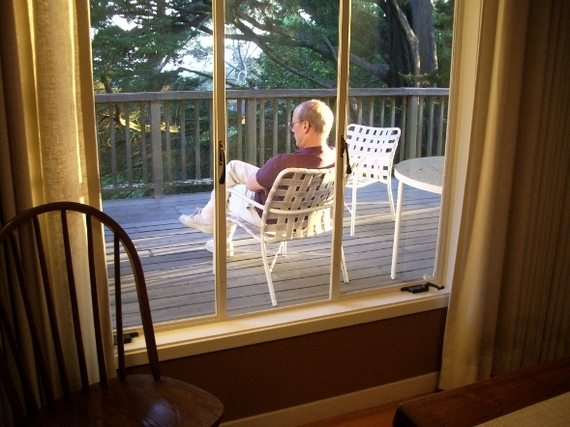I've tried meditating a few times - a very few times. I'm well read on the subject, however. Indeed, I've spent way more time reading about meditation than I've spent doing it.
Why would I want to just sit there observing my mind, I reason, when I could be outdoors pulling dead blossoms off the shamelessly prolific rhododendron in our front yard? Those blossoms snap off their stems with such a satisfying pop.
(I do nothing to make that plant bloom. Yet year after year it sucks up dirt and rainwater and blasts dozens of grandiose purple-blue blossoms into our tiny front yard. Hardly anybody notices this plant or its outrageous flowers. It produces them anyway.)
Meditate -- Or Sort the Socks?
So - why would I want to just sit there, meditating? I could be calling my son in Minneapolis, my fingers still sticky with rhododendron sap, to ask about his new puppy. I could be sorting my husband's socks. I could be having fun.
People like Sylvia Boorstein make a great case for the practice of meditation. Her book, Don't Just Do Something, Sit There, is one of my favorite ways to think about meditating without actually doing it.
Sylvia is very convincing, but the sitting vs. doing trade-off has never worked for me. Sit quietly for a half hour? I'd rather be taking out the garbage or brooming cobwebs off the windows in the garage. I like the physical world, right down to compost heaps and window sills speckled with dead fruit flies.
I've Got a Life
A life is to be lived. And for the time being I've got one. Why would I want to spend any of it sitting there watching my thoughts go by - when I could be out in the world, generating new ones?
Yet - right now I'm thinking maybe a little meditating could do me some good.
A friend once gave me a copy of an essay that Thomas Merton wrote way back in 1968. It's called "Creative Silence." In it, Merton makes a distinction between negative silence and creative silence. In negative silence, we fret and stew and let our anxieties run off with our thoughts. In creative silence, we experience what Paul Tillich called "the courage to be."
Creative silence requires a certain kind of faith, Merton says. (If you're like me, you're not keen on the word faith. It has a squishy, sentimental, boasty feel to it. So, bear with me here. Merton uses the word in a specific way.)
Faith, says Merton, requires us to cut through the smokescreen of our daily activities, our busyness, the charming or efficient or competent personas we present to the world and to ourselves. Our talky prayers can be a smokescreen. So can the ideas about God that our traditional religions have constructed for us over the centuries.
Merton: God as a Kind of Idol
All those reassuring slogans and routines of religiosity, says Merton, "can become a substitute for the truth of the invisible God of faith, and though this comforting image may seem real to us, he is really a kind of idol."
We fear genuine silence, Merton says. We are afraid of being alone in the nakedness of our true selves without our usual masks of competence or sociability. Why are we afraid? Because we've lost hope of ever reconciling with - of accepting - our true selves.
By faith I think Merton means the willingness to trust that, if we set aside the busyness of our days and the busyness of our thoughts and we go fully into silence, someone - our true selves - will be there to meet us. As will God.
I like Merton's take on silence. But does that mean I'm about to take up meditating? Time spent in meditation might be like time spent with a Stairmaster or a hair dryer. I might like the results.
No, sitting meditation is not for me right now, but Merton's silence is. And so, as I snap the spent rhododendron blossoms from their stems or wait for the phone to pick up in Minneapolis, I'll remember the silence. I'll listen for that wordless self of mine.
c 2015 Barbara Falconer Newhall, All Rights Reserved
Don't Just Do Something, Sit There: A Mindfulness Retreat with Sylvia Boorstein, by Sylvia Boorstein, Harper Collins, 1996.
"Creative Silence," by Thomas Merton, first published in April, 1968, in Bloomin' Newman, by University of Louisville students. Reprinted in Thomas Merton: Essential Writings, Christine M. Bochen, ed., Modern Spiritual Masters Series, Orbis Books, 2000.
A version of this story first appeared on BarbaraFalconerNewhall.com, where Barbara riffs on life, family, books, writing, and her rocky spiritual journey. Barbara is a veteran newspaper journalist whose stint as the religion beat reporter at the Contra Costa Times in the San Francisco Bay Area inspired her newly released interfaith book "Wrestling with God: Stories of Doubt and Faith."

